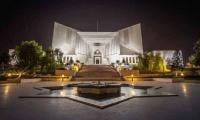The Sindh High Court has directed the public property court to accept police reports in encroachment cases and proceed with the matters in accordance with the law.
The direction came on application filed by the prosecution department that challenged various orders passed by the Sindh Public Property (removal of encroachments) Court in different cases in which various reports had been declined under the section 173 of the Code of Criminal Procedure (CrPC) on ground of delay.
A deputy prosecutor general submitted that the special court had declined acceptance of various police reports in different cases on the ground that they were filed after the statutory period of 14 days.
A counsel for the respondent supported the impugned order on the ground that already in respect of the subject property, a suit was pending before the high court between the respondents and Board of Revenue.
A single bench of the SHC headed by Justice Mohammad Iqbal Kalhoro after hearing the arguments of the counsel observed that the impugned orders were not sustainable under the law. The high court observed that there was no provision in the CrPC that stipulated that after a statutory period of 14 days, the report under the Section 173 would not be accepted by the court.
The SHC observed that if the report under the Section 173 of the CrPC was not submitted within the stipulated period, it would only indicate the fact that the investigation could not be completed within time, for which the investigating officer could be taken to task, but insofar as the FIR was concerned, it could not be disposed of on such grounds by not accepting the report under the Section 173.
The high court observed that as per the deputy prosecutor general, in some cases, the report was submitted with a delay of only seven days. The bench observed that the trial court had overlooked completely the scheme under the section 344 of the CrPC that empowered the court to allow delay in submission of challan for reasonable time in certain circumstances, meaning thereby that such a delay was not against the spirit of law.
The high court further observed that in certain circumstances, which may include incompletion of investigation, the trial court could condone delay in submission of final report under the Section 173 of the CrPC within the same provision of law because such report prima facie suggested collection of evidence presentable in the court for the purpose of trial against the accused.
The bench observed that the trial court without looking into such material could not proceed to decline the report under the Section 173 and drop the charge against the accused by simply saying that the said report had been filed beyond the statutory period.
The SHC observed that the statutory period put only a cap on the investigation officer to finish the investigation within but did not imply innocence or otherwise of the accused or stoppage of proceedings emanating from the FIR.
The bench observed that if a person had committed an offence, he could not be allowed to go scot-free just because the investigation officer had remained incompetent to complete the investigation within time.
The high court observed that the trial court was, at the most, empowered to issue a show-cause notice to the investigation officer over the late submission of the report under the Section 173 of the CrPC but, at the same time, was obligated to proceed with the matter against the accused on merits by examining the evidence collected during the investigation.
The SHC granted application of the prosecution and directed the special court for public property to accept the reports under the Section 173 of the CrPC and proceed with the matter in accordance with law.







